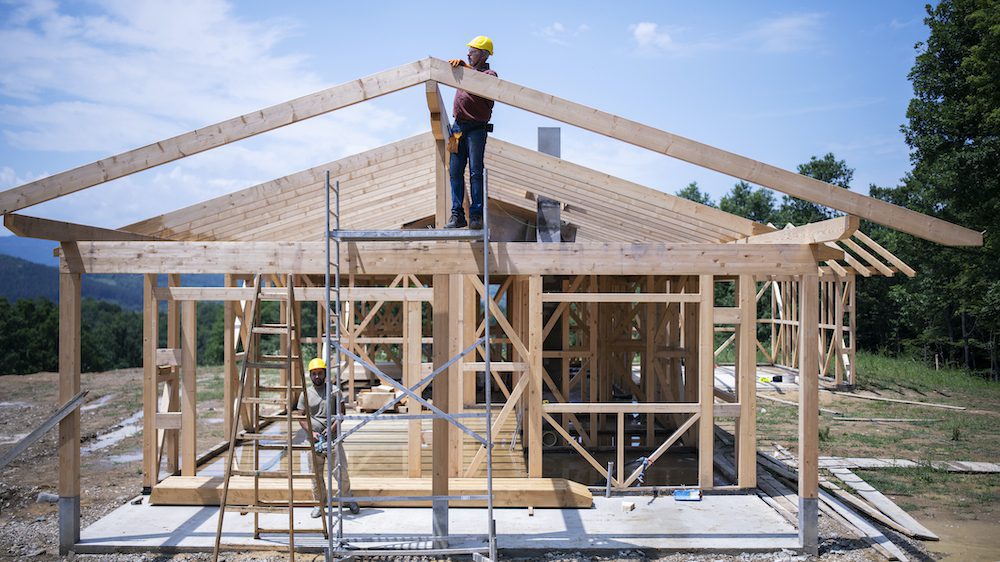Want To Build Your Own House? The Pros, Cons, and Costs: Massachusetts Homebuyers Homeownership
Building a brand-new home may sound like a dream come true. You get to choose the ideal layout for your family’s needs, and have a say in each and every design element. However, the process may also be daunting if you’ve never done it before. To help you through it, we’ve created this Guide To Building Your Own Home. It will provide all the detailed information you need at each stage of the home-building process so that everything goes as smoothly as possible. In this first article, we’ll offer a glimpse into the pros and cons of building a house, including how much it costs, how long it takes, how it’s financed, and much more that will help you decide if this option is right for you.
Pro: You can get exactly what you want
Building a home is a popular option these days. Construction on single-family homes was up 10 percent in November 2020 compared with the previous year, according to the National Association of Home Builders. And, it makes sense: When you build your own home, you get exactly what you want: an in-law suite for when the grandparents visit, a decked-out office for working from home, midcentury modern style, and more. Anything is possible. “You get a blank slate,” says Marc Rousso, CEO of JayMarc Homes in Seattle. “The fun part about building a custom home is that it can be whatever you want.”
That might sound overwhelming, so Rousso suggests starting with a vision board. Check out websites like Houzz or Pinterest, and drive around snapping photos of homes you like. Then think through how big you want the home to be, how many bedrooms and bathrooms you need, and the bonus spaces you want to live as comfortably as possible. The best way to make sure you get what you want (and that it fits within your budget): Hire a great builder from the start. This crucial step sets the best possible foundation (in every sense of the word) for your new home. Builders help you select others on your team (such as an architect, interior designer, and landscaper) and serve as your point person throughout the process.
Not sure how find a homebuilder? NAHB offers an online directory, and its members are committed to ongoing education and ethical standards. Hiring builders who have been in business for several years is also a plus, as they’ve proven they can weather both the highs and lows of economic cycles.
Pro: You can build just about anywhere you want
Have you always dreamed of living by the water or having a mountain view? Or maybe you want no neighbors in sight? Building a home lets you set up your residence just about anywhere you want. Talk to your builder before making a land purchase, though, Rousso urges. The builder will need to do a feasibility study on the land to make sure it’s a suitable place for the home you want to build.
“We’ve talked more people out of buying land than into buying land, because there are so many pitfalls,” he explains. Builders help make sure the land is zoned for residential development and identify any issues with building on the site, such as connecting to utilities or developing the land before building can start. Another thing to note: Land development can be costly. HomeAdvisor estimates it to be $1.30 to $2 per square foot of land, including surveying, drainage plans, utility and septic mapping, permits, soil testing, land clearing, excavation, and demolishing any existing structures.
Pro: New homes typically come with less maintenance
An obvious advantage of building a home is that everything is brand new. That means maintenance and repairs will be minimal or even nonexistent for a while, saving you plenty of headaches and thousands of dollars a year. According to HomeAdvisor, in 2020, homeowners spent an average of about $3,200 on home maintenance.
Nonetheless, a new house isn’t entirely maintenance-free. You’ll probably still need to do yardwork to keep up your newly installed landscaping. And you may want to pay for some preventive upkeep, such as a maintenance contract on your HVAC system, costing $150 to $500 a year. But that could save you money in the long run.
Con: Building usually costs more than buying an existing home
Building a house is an expensive enterprise, and typically costs more than buying a preexisting home. As such, you’ll need to have some in-depth discussions with your builder on what you want, and whether it’s affordable for you. “A builder can help guide the design process starting with schematic design to give the prospective client an idea of the budget,” says Tim Benkowski, senior project manager at Balsitis Contracting in Lake Geneva, WI. “That way, design revisions can be made early without the owner falling in love with a home design only to find out they need to cut out their favorite parts or reduce the project scope.”
Several factors determine how much your newly constructed home will cost: location, size, complexity, and design elements. The NAHB estimates that the median price of constructing a single-family home is $289,415, or $103 per square foot. Labor typically constitutes about 40 percent of the cost, followed by permits, design fees, and materials. Here’s more on how much it costs to build a house.
Con: Getting a construction loan can be complicated
To finance building a home, you’ll need a construction loan, which is a little more involved than getting a traditional mortgage to buy a preexisting house, says Steve Kaminski, head of residential lending at TD Bank. For starters, you’ll likely need a 20 percent down payment since construction loans are considered higher risk. Along with the usual financial documents needed for your loan application, you need to provide project plans, costs, and land value. You also need a signed contract or purchase contract with the project’s plans, specs, and budget details, and a timeline for the construction.
“The lender is not only evaluating the borrower, but also the project plans and oftentimes the builder to ensure they will be financially solvent throughout construction,” Kaminski explains. Construction loans are usually shorter-term, covering just the duration of the build, and may have higher interest rates, usually about 1 percent higher than conventional mortgages, according to the Consumer Financial Protection Bureau.
Once the home is completed, you can pay off the balance or convert the loan to a conventional mortgage. The interest rate and the type and terms of the mortgage will depend on your credit history and lender. When shopping around for a mortgage for a new home build, Kaminski urges borrowers to go with a lender experienced in working with construction loans.
Con: Building a home takes a while
Generally, it takes a bare minimum of three months to build a simple house, and it can take much longer. But it’s a “sliding scale,” says Benkowski. “A 2,500 square foot and under [home] can typically be completed in seven to nine months with proper planning. A 7,500 square foot home and up would likely take 12 to 30 months.”
Planning as much as you can will keep the project on track. Still, delays do happen. Weather is the biggest one, with temperature shifts and rain or snow postponing work. Your own choices could also be to blame. If you’re taking too long to choose your favorite flooring or windows, it could make it all take a little longer. Here’s more on how long it takes to build a house. In the next installments, we’ll cover how to buy land, design tips, the ins and outs of mortgages for home construction, and lots more.
The post Want To Build Your Own House? The Pros, Cons, and Costs appeared first on Real Estate News & Insights | realtor.com®.

FIRST TIME HOMEBUYERS
Selecting the Right Homebuyer's agent
 Unlike most other real estate agents, a MABA home buyer's broker never represents both a buyer and seller in the same transaction so you never have to worry whether a MABA agent is really looking out for your best financial interests. A MABA buyer's agent acts as your advocate, real estate educator, advisor and negotiator, always loyal to you and dedicated to helping you find and buy the best home with the best terms at the price and showing you which homes to avoid along the way.
Unlike most other real estate agents, a MABA home buyer's broker never represents both a buyer and seller in the same transaction so you never have to worry whether a MABA agent is really looking out for your best financial interests. A MABA buyer's agent acts as your advocate, real estate educator, advisor and negotiator, always loyal to you and dedicated to helping you find and buy the best home with the best terms at the price and showing you which homes to avoid along the way.
Fewer than one percent of the agents and brokers in Massachusetts meet our high standards.
Whether you are ready to buy now or just beginning your home buying journey, click here to choose a Great Buyer's Agent to answer all of your home buying questions!
Article From: "Erica Sweeney" Read full article
Get Started with MABA
For no extra cost, let a MABA buyer agent protect your interests



